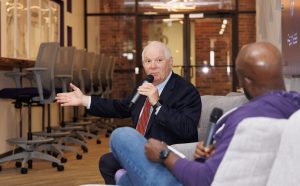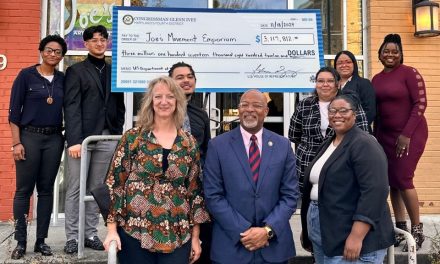By Megan Sayles
AFRO Business Writer
msayles@afro.com
Senator Ben Cardin (D-MD) led a roundtable discussion with Maryland’s minority- and women-owned businesses alongside Fearless CEO Delali Dzirasa in Baltimore on June 16.
During the conversation, Dzirasa asked Cardin about how policymakers can advance minority and women entrepreneurs through existing and emerging legislation, his contributions to these enterprises during his tenure and the challenges that these businesses face today.
Cohort members of Fearless’ Hutch program, which supports underrepresented entrepreneurs who are building government digital services firms, also had the opportunity to ask the senator some questions.
The AFRO compiled the most important topics from the roundtable for a Q&A below. The responses have been edited for length and clarity.
Q: You recently announced your retirement, which is set for next year. In terms of supporting small businesses, what are you most proud of in your career?
A:When you’re elected to the U.S. Senate, the majority leader asks what committees you want to serve on. I initially asked to serve on the Small Business Committee. I was the only new member in 2006 to specifically ask for that. Part of the reason was personal. My grandfather came to this country a long time ago and started a business in downtown Baltimore. It grew, and he created wealth for our family. I saw what entrepreneurship can mean.
In my first year, I brought the Small Business Administration (SBA) into my office to look at their numbers. I was appalled by the lack of diversity at the SBA’s programs. They were not reaching women, and they were not reaching minorities. The numbers were close to zero.
I set a priority of joining the committee to open up opportunities. Why? Because it’s the right thing to do and it’s what America’s values are all about. Secondly, our economy depends upon everyone being engaged.
When COVID-19 hit, Republicans were sitting down with us to develop programs that help small businesses. They wanted to use conventional banks as a major source under the Paycheck Protection Program. I said that’s not going to work for a lot of small businesses that don’t have good relationships with banks. In the original legislation, I was able to include a commitment to reach traditionally underserved communities, and we engaged CDFIs and mission lenders to do that.
I was also able to set up a grant program for entrepreneurs at historically Black colleges and universities (HBCUs) that’s named after Parren J. Mitchell, who is my role model for small businesses. He was the first African-American congressman from Maryland, and he created the first set-asides on small business contracts for minorities.
Q:What can we expect from our representatives to continue to support and empower small, minority-owned businesses, and furthermore, are there any specific policies that we should be on the lookout for to ensure our sustained growth and success?
A: We have programs specifically aimed at underserved communities. The U.S. government is the largest purveyor of goods and services in the world, so doing business with the federal government presents opportunities. Twenty three percent of agencies’ procurement must go to small businesses. Not every agency is meeting those goals, but we’re doing very well under President Biden.
We have an 11 percent goal for small, disadvantaged small businesses. We exceeded that for the first time under President Biden. We’re also working on getting more prime contracts, instead of subcontracts, for these enterprises. That requires us to get agencies to make the contracts compact enough so that smaller companies can bid on the full contract.
In terms of capital, we are trying to strengthen the SBA’s Community Advantage program, which requires 60 percent of lenders’ loans to go to underserved communities. We’re also looking for ways to get grants to startup companies because a lot of them cannot afford to take on more loans.
Q: What initiatives or plans are there to address economic growth in lower-income communities? [1] [2] [3]
A: We’re working under certain court restrictions on how we can target SBA programs to lower-income communities. I wish we didn’t have to do that, and I disagree with that. We can target help based upon the income of the community, but we’re not allowed to directly target programs based upon gender or race. Those issues present a more difficult challenge for us in regard to the legal standing of such set asides.
Just to give you one example, when we set up the Restaurant Revitalization Fund, we initially targeted by race. The courts didn’t allow that. But, we have a lot of programs, like New Market Tax Credit, that set aside funding for lower-income communities. Our mission lenders also have to do that.
We want to see the relationship between serving lower-income communities and reaching traditionally underserved minority communities and women. We’re getting those numbers back, and quite frankly, there’s a strong correlation between helping lower-income communities and helping women and minorities.
Megan Sayles is a Report for America Corps member.
#smallbusiness #minoritybusiness #womenbusiness
Related Articles:
The post Ben Cardin and Fearless host roundtable for minority- and women-owned business owners appeared first on AFRO American Newspapers .










